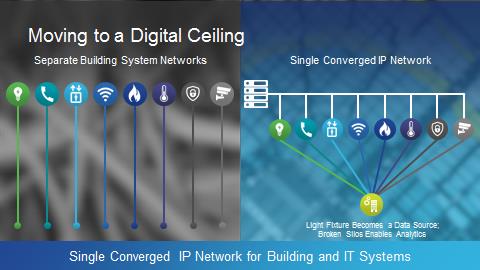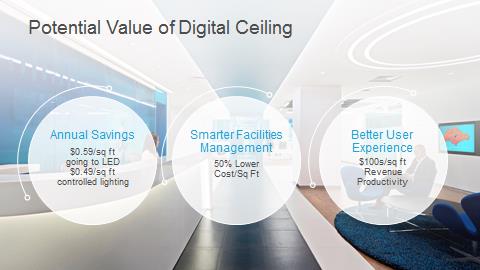Digitization is fundamentally reshaping business — and new technologies are changing the way we think about managing commercial indoor spaces.
A couple of interesting facts:
- 40% of a building’s operational expense is keeping the lights on. Using LED lighting can cut those costs in half and using network-powered smart lighting cuts costs even further.
- 23% of all global electricity is used in commercial buildings. Simply reducing energy use by about 30% can yield up to a 5% higher operating income and building asset value.
It’s not just about cost or efficiency and lighting is only a small part of a much bigger opportunity. Organizations that are turning to digital technologies can rapidly:
- Transform processes and business models for faster time to market and leaner operations.
- Personalize customer/citizen experiences for increased loyalty and greater insight to predict future purchases.
- Empower workforce efficiency and innovation for better productivity and employee retention.
Innovations in building systems such as lighting and HVAC make it possible for building owners and managers, as well as architects and lighting designers, to increase efficiency and transform user experiences. This applies to any building – offices, hospitals, schools, retail stores, hangars, and manufacturing plants.
Let’s talk about why this segment is ripe for the next wave of digital solutions.
Today, Cisco announced new Digital Solutions in three categories: Customer Experience, Workforce Experience, and the Cisco Digital Ceiling. The Cisco Digital Ceiling is about connecting previously silo’d building systems and services on a single IP network. In the Digital Ceiling, users can converge lighting, heating, cooling, sensors and other actuators, in order to make a building not only smart, but seamlessly and securely connected. The Cisco Digital Ceiling improves the efficiency and sustainability of your buildings and enables you to manage them more effectively. The same platform can also be used to deliver highly personalized user experiences that improve the productivity, safety, and comfort of building occupants.

Cisco is working with industry leaders in lighting, building automation control, enablers and ISVs to ensure we have a rich set of solutions powered by the network to help our customers move to a Digital Ceiling.
The potential is incredible. Imagine an office building where by checking into a room, that user’s preferred light intensity and color, room temperature, and phone and video profiles are automatically set. Consider a workplace scenario where daylight harvesting, automatic dimming controls, and presence-based lighting save energy and reduce costs. Picture a retail environment where Digital Ceiling analytics of traffic patterns are used to improve store layouts, merchandise placement, staff allocations, and security.
The value is real. Using the Cisco Digital Ceiling to adapt lighting to actual user needs means potential energy savings of $1.08 per square foot annually in commercial spaces1. The Digital Ceiling can help building managers make better use of their space to reduce cost per square foot by as much as 50% based on improved building layouts verified by occupancy analysis2. In a retail environment, improvements in lighting and signage can result in an increase in potential sales revenue on the order of hundreds of dollars per square foot3.

The Digital Ceiling is making a difference now. A great example of a customer that is capturing this value now is Central Iowa Power Cooperative (CIPCO), Iowa’s largest energy provider. CIPCO wanted to be able to demonstrate energy efficiency as well as create a platform for future IoT innovation. CIPCO deployed a Cisco Digital Ceiling solution using Cisco Catalyst 3560-X Switches, they replaced existing fluorescent lights with LED troffers, and deployed Cisco switches and UPOE-powered lights with sensors. The result was 85% lower energy costs for lighting and optimized space utilization. This digital transformation also helps CIPCO set the stage for future innovations.
Digital Ceiling is really just the beginning of the next major evolution in an entirely digital workspace enabling better innovation and leaner operations, enhanced productivity and employee retention, and improved ability to deliver customized experiences.
Interested in learning more? Find out more about the Cisco Digital Ceiling solutions and partner community that makes it possible.
Be sure to give me your feedback in the comments section. What do you think of Cisco’s Digital Ceiling framework and solution set?
[1] UC Berkeley
[2] F. Moavenzadeh, Keisuke Hanaki, Peter Baccini. Future Cities: Dynamics and Sustainability
[3] USA Today
![EBC_DigitalCeiling_3.1[1]](https://alln-extcloud-storage.cisco.com/Cisco_Blogs:ciscoblogs/EBC_DigitalCeiling_3.11-550x275.gif)
A great innovation – the productivity alone, based on saving 25,000 employees three minutes a day, can save a company over $2 million a year (based on research by Intranet Dashboard).
Also creating: ilovemymazdaquote.weebly.com
Thinking within the box seems the place to be. The opportunities within self improvement seem real and so tangible. I love the concept. Preserving our energy moves the envelope towards increasing our human capacity in so many ways.
We are willing to consider for our new tower 750000sq ft IT SEZ TOWER, PLEASE CONTACT IMMEDIATELY.
Great thinking…energy saving is key for future generations to live green.
I applaud Cisco’s vision of the Digital Ceiling. It is this type of vision that will help the world realize the benefits of SSL lighting and what can truly be accomplished. The key now is allow for retrofitting of existing lighting infrastructure so all can benifit from this remarkable tech cost effectively.
Woah! I’m really enjoying the template/theme of this blog.
It’s simple, yet effective. A lot of times it’s difficult to get that “perfect balance” between usability and
visual appearance. I must say that you’ve done a very good job with this.
Also, the blog loads super quick for me on Internet explorer.
Outstanding Blog!